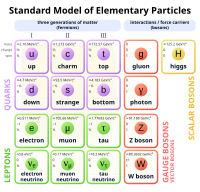
Photo from wikipedia
A magnetic impurity on a superconductor induces Yu-Shiba-Rusinov (YSR) bound states, detected by tunneling spectroscopy as long-lived quasiparticle excitations inside the superconducting gap. Coupled YSR states constitute basic elements to… Click to show full abstract
A magnetic impurity on a superconductor induces Yu-Shiba-Rusinov (YSR) bound states, detected by tunneling spectroscopy as long-lived quasiparticle excitations inside the superconducting gap. Coupled YSR states constitute basic elements to engineer artificial superconducting states, but their substrate-mediated interactions are generally weak. In this Letter, we report that intramolecular (Hund's-like) exchange interactions produce coupled YSR states across a molecular platform. We measured YSR spectra along a magnetic iron-porphyrin on Pb(111) and found evidence of two distinct interaction channels, which invert their particle-hole asymmetry across the molecule. Numerical calculations show that the identical YSR asymmetry pattern of the two channels is caused by two spin-hosting orbitals with opposite potential scattering and coupled strongly. Both channels can be similarly excited by tunneling electrons into each orbital, depicting a new scenario for entangled superconducting bound states using molecular platforms.
Journal Title: Physical review letters
Year Published: 2021
Link to full text (if available)
Share on Social Media: Sign Up to like & get
recommendations!